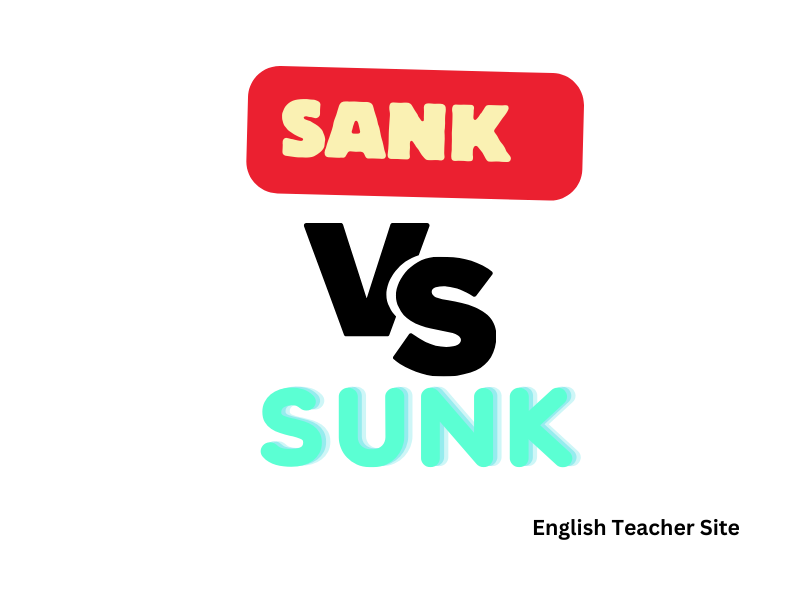Sank vs Sunk – Understanding the Past Tense of “Sink”

- “Sank” is the simple past tense form of “sink,” and “sunk” is the past participle form.
- Past participle “sunk” is used with auxiliary verbs to form perfect tenses or as an adjective.
- Correct usage of “sank” and “sunk” enhances clarity and grammatical accuracy in communication.
The distinction becomes more apparent when the forms are used in sentences. The past participle “sunk” is employed in perfect tense constructions and sometimes as an adjective. It’s correct to say, “The treasure has sunk to the sea floor” or “The sunk treasure took years to find.” Recognizing the difference in usage between “sank” and “sunk” not only helps in writing grammatically correct sentences but also improves the clarity and accuracy of language use.
Sank vs Sunk – What’s the past tense of sink?
In the English language, sank and sunk represent two different past tense forms of the verb “to sink.” Their use depends on the grammatical context.
Sank is the simple past tense of “sink,” which describes an action completed in the past. For example:
- The boat sank yesterday.
Sunk is the past participle form and is used with auxiliary verbs to form perfect tenses. As such:
- The boat has sunk.
The distinction can be understood better with the following tables:
| Simple Past Tense | Example Sentence |
|---|---|
| Sank | The ship sank last night. |
| Past Participle | Example Sentence |
|---|---|
| Sunk | The ship has sunk. |
In both British and American English, “sank” and “sunk” serve specific grammatical functions and cannot be used interchangeably without changing the meaning of the sentence. Here are some points to remember:
- Simple past tense (“sank”) is for actions completed at a definite time in the past.
- Past participle (“sunk”) is used in perfect tenses and often follows “has,” “have,” or “had.”
When teaching or learning English grammar, it is crucial to be aware of these distinctions to ensure correct usage.
Different Tenses of the Irregular Verb “Sink”
The verb “sink” is an irregular verb in the English language, leading to some confusion regarding its correct past tense forms. Irregular verbs do not follow the standard patterns of conjugation, and “sink” is no exception. Knowing the different tenses of “sink” is crucial for proper grammatical usage.
Present Tenses:
- Simple Present: He, she, it sinks; I, you, we, they sink
- Present Continuous: He, she, it is sinking; I, you, we, they are sinking
- Present Perfect: He, she, it has sunk; I, you, we, they have sunk
- Present Perfect Continuous: He, she, it has been sinking; I, you, we, they have been sinking
Past Tenses:
- Simple Past: He, she, it sank; I, you, we, they sank
- Past Continuous: He, she, it was sinking; I, you, we, they were sinking
- Past Perfect: He, she, it had sunk; I, you, we, they had sunk
- Past Perfect Continuous: He, she, it had been sinking; I, you, we, they had been sinking
To provide clarity, here are two tables illustrating a clearer comparison between simple past tense and past participle forms:
Simple Past Tense
| Subject | Verb |
|---|---|
| I | sank |
| You | sank |
| He/She/It | sank |
| We | sank |
| They | sank |
Past Participle
| Subject | Verb Phrase |
|---|---|
| I | have sunk |
| You | have sunk |
| He/She/It | has sunk |
| We | have sunk |
| They | have sunk |
In summary, “sank” is the simple past tense, conveying an action that was completed in the past. “Sunk” is the past participle, used with auxiliary verbs such as “have” or “has” to form the present perfect tense, indicating an action that has been completed at some point in the past relative to the present. It is also used in the past perfect tense to show that an action was completed before another action in the past.
Exploring the Correct Usage with verb ‘Sink’
The verb ‘sink’ is an irregular verb, where its past forms don’t follow a standard pattern of conjugation. This section will help clarify the distinction between ‘sank’ and ‘sunk,’ ensuring correct usage in various sentences.
Understanding Sank and Sunk
‘Sank’ and ‘sunk’ are both past forms of the verb ‘sink,’ but their usage differs sharply. ‘Sank’ is the simple past form, also known as the preterit, which is used for actions that were completed in the past. ‘Sunk,’ on the other hand, is the past participle form and is used with auxiliary verbs like ‘has’ or ‘had.’
Simple Past (Sank)
- Used without auxiliary verbs
- Indicates completed action
Past Participle (Sunk)
- Used with ‘has,’ ‘have,’ or ‘had’
- Forms perfect tenses
The Past Tense of Sink
To employ ‘sink’ in the past tense, or the simple past, ‘sank’ is the correct form to use. It represents an action that started and finished at a specific time in the past. Ensure that ‘sank’ stands alone without helper verbs.
Examples:
- The ship sank in the Atlantic Ocean.
- He sank into despair after the news.
The Past Participle of Sink
The verb ‘sunk’ is the past participle form of ‘sink’ and requires an auxiliary verb to construct perfect tense forms. It is used in present perfect, past perfect, and future perfect tenses, often in conjunction with ‘has,’ ‘have,’ or ‘had.’
Examples with Past Participle:
- The boat has sunk to the ocean floor.
- The evidence had been sunk into the sea before the trial.
Sentences using the past participle “sunk”
Creating sentences with the past participle ‘sunk’ entails using it alongside an auxiliary verb to properly convey the timing and completeness of an action.
Examples:
- The treasures have sunk too deep to be recovered.
- The facts had been sunk into his memory over years of study.
The verb ‘sink’ is a powerful word with specific past forms that conflate its straightforward base into a complex verb with multifaceted uses. Through the knowledge of ‘sank’ as the past tense (simple past) and ‘sunk’ as the past participle, one can proficiently navigate past narratives and perfect constructions in the English language.
Synonyms for the word “sink”
In the English language, words often have synonyms—alternative terms that convey similar meanings. Regarding the verb “sink,” several synonyms capture its essence in various contexts. These synonyms are useful in evading repetition or when a certain nuance is needed in writing.
Primary Synonyms:
- Submerge: Often used when an object goes under water.
- Drown: Typically involves submersion with an inability to resurface.
- Plunge: Suggests a swift and forceful descent.
- Descend: A more general term for moving downward.
Contextual Synonyms:
- Lower: May imply a controlled movement downwards.
- Drop: Often denotes a sudden fall.
- Immerse: Especially relevant when something is completely covered by a liquid.
Here are two tables categorizing synonyms based on common usage scenarios:
Table 1: Synonyms for Physical Descent
| Verb | Usage Example |
|---|---|
| Submerge | The submarine submerged into the ocean depths. |
| Plunge | The stone plunged into the river causing ripples. |
| Descend | The hot air balloon slowly descended back to land. |
Table 2: Synonyms for Emotional/Circumstantial Decline
| Verb | Usage Example |
|---|---|
| Founder | The company foundered after the severe market crash. |
| Collapse | His alibi collapsed under scrutiny from the detectives. |
| Diminish | Her influence in the committee gradually diminished. |
From these examples, it’s evident that while the verb “sink” has many synonyms, the applicability of each depends on the specific context of its use.
Source
Etymology online, origin of sink
My name is Khamis Maiouf. I am the creator of the English Teacher Site, dedicated to providing valuable resources and insights for students around the world. With a passion for education and a commitment to helping students enhance their skills, I aim to make English teaching more effective and enjoyable for both educators and students.





